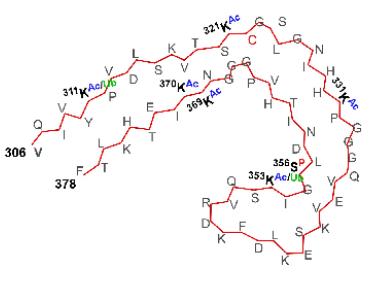PTM Sites Identification Service
Unraveling the intricate world of PTMs hinges on the identification of modification sites—a foundation for in-depth PTM studies demanding precision and exhaustive data analysis. Drawing on years of expertise in protein research, Creative Proteomics harnesses the potency of advanced mass spectrometry technology. This enables the precise and comprehensive identification of PTM modification sites, serving as a valuable resource for researchers delving into the complexities of protein studies.
What is PTM Sites Identification
Proteins, the workhorses of cellular functions, undergo a myriad of modifications after translation. PTMs play a pivotal role in regulating protein activity, localization, and interactions. Among the diverse PTMs, the identification of modified proteins has emerged as a crucial area of study in proteomics. This field focuses on unraveling the complexity of modifications occurring beyond the genetic code, shedding light on the dynamic nature of cellular processes. Understanding PTMs is akin to deciphering a secret language written on proteins. These modifications, ranging from phosphorylation to glycosylation, serve as molecular switches, fine-tuning cellular responses to internal and external stimuli. Unraveling this intricate language requires advanced techniques, and PTM sites identification stands at the forefront of this scientific endeavor.

Fig.1 Schematic of PTM sites (Park. S, et al., 2018)
PTMs can occur at specific sites in a protein's amino acid sequence by covalently binding to chemical groups or small molecular weight proteins, which can lead to an increase in their molecular weight. PTM sites can be identified by detecting changes in the molecular mass of proteins before and after modifications, but this relies on sophisticated technologies that can detect and characterize proteins. Mass spectrometry-based technology is the core of PTM sites identification. LC-MS/MS can accurately determine the molecular mass of proteins or peptides to identify PTM sites and types of modifications, of which the types of modifications that can be detected are phosphorylation, glycosylation, acylation, ubiquitylation and methylation, etc.
Applications of PTM Sites Identification
The applications of protein PTM identification are vast, spanning across various biological disciplines, such as:
Disease Research
Understanding PTMs is crucial to unraveling the molecular mechanisms underlying diseases. Aberrant PTMs are often implicated in conditions like cancer, neurodegenerative disorders, and metabolic diseases. Identifying modified proteins offers valuable insights into disease pathology and potential therapeutic targets.
Drug Discovery
Many drugs target specific proteins, and PTMs can significantly influence drug efficacy. Identifying modifications aids in designing drugs that precisely target modified proteins, improving therapeutic outcomes and reducing side effects.
Signaling Pathways
PTMs are key players in cellular signaling pathways. Identifying modified proteins provides a detailed map of signaling cascades, offering a comprehensive understanding of how cells respond to stimuli. This knowledge is essential for developing targeted interventions for various cellular processes.
Our Service
Creative Proteomics has advanced protein detection technologies and can provide customized services to researchers and scientists to help them reveal the complexity of PTM using powerful mass spectrometry technologies. Our services are thoughtful and detailed and the process of PTM sites identification service is as follows:

Fig.2 PTM sites identification workflow
Advantages of PTM Sites Identification
- Accuracy and Specificity
Mass spectrometry-based methods offer high accuracy and specificity in identifying modification sites. - High Throughput
Advances in mass spectrometry technology have greatly increased the throughput of PTM identifications, enabling the simultaneous analysis of a large number of samples and accelerating discovery in both basic and clinical research. - Global Analysis
PTM identification does not only focus on individual proteins, but also globally analyzes modifications across the entire proteome, which provides a comprehensive view of protein research.
Protein PTM identification is a cornerstone of the proteomics field, enabling researchers to decipher the complex language of protein modifications, and its identification has multiple advantages that make it an indispensable tool for modern biology.
Creative Proteomics provides comprehensive and high-quality proteomics analysis services. If you are interested in PTM sites Identification, please contact us for more details.
Reference
- Park S.; et al. Degradation or aggregation: The ramifications of post-translational modifications on tau. BMB reports. 2018, 51(6): 265-273

